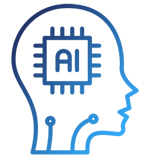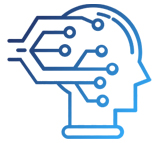- AI

Artificial Intelligence

Smart Products & Services
We follow Smart Products & Services

Intelligent Business Functions & Processes
We follow Intelligent Business Functions & Processes

Robotic Process Automation
We follow Robotic Process Automation

Personalized
healthcareWe follow Personalized healthcare

Identifying at-risk patients
We follow Identifying at-risk patients

Optimized routing and scheduling
We follow Optimized routing and scheduling
- ML

Machine Learning

Predictive
AnalyticsWe follow Predictive Analytics

Service Personalization
We follow Service Personalization

NLP
We follow NLP (Natural Language Processing)

Stock Market Forecasting
We follow Stock Market Forecasting

Fraud Prevention
We follow Fraud Prevention

Recommender engines
We follow Recommender engines
- blockchain

Blockchain

Public Blockchain
We follow Public Blockchain

Private Blockchain
We follow Private Blockchain

DEFI
We follow DEFI Blockchain

Initial stake pool offering development
We follow initial stake pool offering development
- IOT

Internet of Things
- AR
- Business Solutions

Business Solution

Business Performance Management
We follow Business Performance Management

Decision Making & Big Data Analytics
We follow Decision Making & Big Data Analytics

Enterprise Data Management
We follow Enterprise Data Management
- Apps

Apps

Native Apps
We follow Native Apps

Cross Platform Apps
We follow Cross Platform Apps

Web Apps
We follow Web Apps

Hybrid Apps
We follow Hybrid Apps

Cloud Native Apps
We follow Cloud Native Apps
- Lab

Will AI Affect The Consultancy Sector In 2023?
Every generation has got a certain technology that it fears. This dread of psychosis has been in contemporary history since the first industrial revolution, and it stands for the anxiety that people have in response to any form of upheaval. Artificial intelligence, or AI, is the technology that people are most afraid of today.
The imagination and subsequent unease about a world where computers rule over people have been fed by books and movies over the years. The idea that artificial intelligence consulting services would eventually replace human cognition is unsettling for a sector of the economy that relies heavily on human knowledge as its main asset. According to Statista, in the upcoming years, it is anticipated that the global artificial intelligence (AI) software industry would expand quickly, topping 126 billion dollars by 2025. Applications including machine learning, robotic process automation, and natural language processing are all part of the larger AI business.
Is this concern completely unfounded, or does it have some foundation? And then there is the flurry of consulting firms acquiring AI companies! What does this pattern imply? What kind of change, if any, would artificial intelligence bring to the consulting industry: disruption or evolution? In light of what has transpired during the previous few months of this year, this insight makes an effort to envision the future.
How Does AI Fit Into Consultancy Today?

Artificial intelligence has grown to be a very popular tool in the digital age for businesses of all sorts, including the consulting sector. The majority of artificial intelligence (AI) solutions are able to automate laborious processes, get around many operational obstacles, and offer useful insights that can save businesses time and money.
So, it should come as no surprise that more artificial intelligence consulting services are beginning to provide AI solutions as a part of their services. Nonetheless, it is reasonable that individuals, including consultants, are concerned about the potential loss of many human jobs as a result of artificial intelligence as firms become more and more reliant on robots and computers.
A cooperation between humans and robots might result in a condition that is advantageous to both persons and organizations, despite the fact that this worry may have been reasonable when it was initially expressed in 2017.
People contribute the imagination and emotional intelligence necessary to connect with clients, whereas AI can deliver insightful data faster than any manual procedure could.
By combining the greatest human and computer skills, consultants will be able to provide even better services, making them even more appealing candidates for clients seeking unmatched insight into their business processes.
In the end, AI can empower but instead of replace human workers if deployed properly, making consulting employment safer than ever.
Why Humans Cannot Be Replaced By AI?

Despite the obvious advantages of using AI in advising, due to its speed and efficiency, human advisors are still incomparably valuable. Artificial intelligence in consulting should be viewed as a chance to enhance rather than reduce human talents.
Artificial intelligence, for instance, can analyze data more quickly than anybody else and provide trends and insights that would take humans days or weeks to find. As this time is freed up, it may be used to develop original tactics, examine risk profiles, and help clients comprehend their issues.
By doing this, we may enable consultants to offer tailored counsel that always promotes the interests of their clients.
Simply said, human specialists – not artificial intelligence – should be in charge if you’re searching for enthusiastic strategizing and perceptive issue solutions.
Artificial intelligence may make things easier and enable us to work more quickly, but it cannot take the place of a clever consultant who won’t stop working until their customer receives the finest result possible.
In the end, it is sobering to realize that in a profession as complicated as consulting, no amount of technological advancement will ever be able to replace human ingenuity, intuition, and experience.
To achieve excellent results on behalf of clients everywhere, both monovalent forces must work together, and AI should be seen as an ally rather than an adversary.
Hence, the question is: What aspects of consulting cannot be replaced by artificial intelligence? Let’s look at it!
-
Human Capabilities

With the advancement of artificial intelligence technologies, computers may now be taught to learn and act on their own. Even while this is impressive, artificial intelligence does not yet possess the subtlety required to develop deep commercial relationships with people.
Humans naturally use tactics that rely on empathy, understanding, and relating to different points of view in order to persuade, negotiate, and connect with others based on more than simply reasoning and factual information.
Here is where AI falls short since these human components have not yet been incorporated into an AI system’s “vocabulary,” making it unable to comprehend emotions like fear, love, or excitement.
Without these characteristics, a computer system cannot interact with another human in a real, meaningful way from a business standpoint. Because of this, AI will always be unable to handle certain situations where interactions between humans are required.
At least for the time being, duties like selling or presenting an idea are better left to people. Yet, given that artificial intelligence (AI) can make choices and provide recommendations more quickly and correctly than humans, there may still be profitable areas where AI and humans might work together in the future.
-
Using Context to Reason

Given how powerful artificial intelligence is getting, it makes sense that some individuals think technology may someday replace human consultants. AI still lacks several aspects of human emotional intelligence and contextual thinking, though.
Human consultants are able to consider a variety of aspects, including the objectives and preferences of their clients, the local corporate culture, and even the mood of the market. Although AI is capable of processing data to an astounding extent, it frequently falls short when it comes to drawing the best possible conclusions.
Before providing any advice or making crucial decisions, artificial intelligence needs precise data as input, which is sometimes unavailable in commercial contexts. Because to its strength with numbers and calculations, AI therefore increasingly contributes to business services, but it is unlikely to ever completely replace human advisors whose skills lie in understanding context and nuance.
-
Reputation & Trust
It goes without saying that artificial intelligence is revolutionizing how we conduct business. AI-driven solutions are transforming industries with everything from chatbots to predictive analytics.
Yet, trust and reputation are one area where automation has been unable to compete with conventional consulting services. An established, prosperous consultancy firm’s credibility simply cannot be compared to that of an AI solution for many clients and organizations.
This is largely because older generations continue to play important roles in enterprises and may be reluctant to invest in things they don’t fully understand or have expertise with. Despite its potential, artificial intelligence still lacks in reputation and trust, two essential elements in deciding whether to buy a service or product.
Although AI has the potential to replace conventional advisors, this won’t happen until it has earned the same level of respect and trust from clients all around the world. AI application developers in NYC are in charge when it comes to reputation and trust until that time.
Then, How Is AI Affecting Consultants’ Work?

As the business sector continues to change quickly, it is embracing innovations to meet its immediate and long-term needs. One of the advancements that has the potential to revolutionize both business and daily life is artificial intelligence. AI is already widely used in the consulting industry, in addition to manufacturing, life sciences, marketing, and finance. What are the results of the union between consultancy and technology?
First of all, the conflict between established strategy consultancies and technological leaders was sparked by artificial intelligence. To be successful in this scenario, consultancy forms must comprehend the disruption process.
The effectiveness of AI is based on its capacity to digest enormous amounts of data and turn them into useful insights. It can also be extremely important in producing tailored solutions for particular areas, nations, and so forth. Due to their access to large data sets, funding in abundance, and knowledge of how to use AI to tackle challenging issues, technological leaders here have the upper hand.
Initiatives like Google’s Advanced Solutions Lab, which offers clients consulting services utilizing its artificial intelligence capabilities, serve as a shining example of this phenomenon. It is obvious that these IT companies have the advantage when it comes to finding rapid and efficient solutions to problems.
For small and medium-sized enterprises, which might not have access to the same information or resources as larger organizations, traditional consultancies are the best choice. In either scenario, it’s critical to understand that consulting disruption is a continuous process; to keep ahead of the competition, plans must be flexible.
By keeping these things in mind, AI application developers and artificial intelligence consulting services may transform disruption from a danger to a real economic opportunity.
Conclusion
We must realize that AI is already altering the way data is gathered and processed by consultants as we consider how much AI would disrupt the consulting sector. The way AI and consulting are currently intertwined shows a clear trend: companies are embracing AI to boost performance. For projects requiring a lot of data and analysis, consulting firms are anticipated to use AI even more in the near future.
So, we may fairly draw the conclusion that AI would lead to the evolution of the consulting industry, assisting it in producing trustworthy insights while automating a major portion of the process. Furthermore if you are looking for AI application developers in NYC for complete business solutions then get in touch with Sky Potentials.

















































Leave a Reply